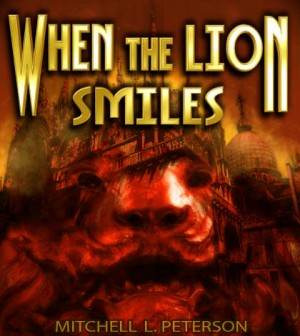He wanted to tell Martin this and the only humorous thing he had experienced in America in San Francisco many years before.
He had gone there on a trip to visit some friends and had wished to rent a car. Before he had left Italy, he had, through his travel agent, reserved the vehicle to drive around the streets of San Francisco, but when he arrived at the rental agency and saw the car that they wished to give him, it was huge. He couldn’t remember exactly, but he thought they called it a Cadillac. It looked as big as a boat to him. He got in the driver’s side, sat behind the wheel, and nervously edged the car out into traffic. He went around the block and came straight back to the agency, got out the vehicle and simply said,
“No. Smaller.”
He couldn’t explain to them that the size of the car frightened him to death and he was afraid that he would have an accident. After a few minutes wait they brought him a subcompact, something he was more familiar with and was able to maneuver through traffic. That was the extent of his experience of driving in San Francisco; that one drive in a big car. It made him chuckle just to think of it. He wished he could tell the American all these things, but he couldn’t.
Potente finished his toast, drank his last swallow of coffee and simply said, “Grazie.” He turned and said something to his daughter and then returned to the counter. Maria came back over and asked Martin if he wanted another toast. For a moment he thought he did, and then it struck him that he was very tired from the long trip. He hadn’t slept well on the plane, he and Ian McFarland had spent most of the train trip conversing and now, well into the afternoon, realized that he was exhausted.
“No, thank you,” he said. “I think I will just like to go to my room now and lie down.”
“Bene, Signor. Please come this way.” Maria said.
Martin walked back through the small dining room to the front desk. Maria went behind the counter and from the pigeonholes to the left, retrieved his room key. It was on the second floor. She told him to go up the stairs and down the hall and it would be his first door on the right.
It suddenly occurred to Martin he had not kept track of his suitcase, and it was gone. Maria understood from the look on his face and said,
“It has already been taken up to your room by the boy.”
~
“Antonio?” Franco called across the room.
Antonio looked up from his book. “Si?”
“I am going home early today. I am confident that you will behave yourself…” he smiled slyly and then continued; “but if anything should arise, call me.”
Antonio studied Sergeant Franco Perer for a long moment. He owed a great debt to this man. Would he ever be able to repay it? How do you indemnify a man who will change the entire course of your life for the better? By paying a lunch tab? By saying thank you? Both were insufficient. No, you paid a man back for his generosity, for giving you your life, with love and with friendship; with a kinship and respectfulness that one would normally reserve for God himself! Mostly you repaid him by being everything he taught you to be, to the absolute best of your ability. You lived your new life by his peerless example and tried to emulate him in every way. Above all, you learned from his mistakes and did him the highest honor by avoiding them! Antonio was a man capable of such lofty honor and he would reverence Sergeant Franco Perer for the rest of his life and in a manner that he hoped his son, come the day he was blessed with one, would honor him.
“Si, Franco.” He answered.
Franco shoved some documents into his satchel, locked his office door and strolled out into the street. He turned left and walked parallel to the small canal that bordered the Questura, crossed a small bridge and then left again into the small narrow alley between the Palazzo Ducale and the Danielli hotel toward the Moto Nave, the ferry boat that would take him to his home on the Lido. The late afternoon Riva was full of tourists; businessmen and residents of Venice alike and he wove his way through the crowds toward the big white boat with his bag of stale bread. He would sit on the fantail in the brisk evening air and throw pieces of day old bread to the gaggle of seagulls that invariably followed the boat for the fifteen minutes that it took to cross the lagoon. He could even coax one or two of the larger and braver birds to actually snatch pieces from his fingers but this afternoon he would be content to just throw the bread into the breeze and watch the acrobatics of some of the world’s finest slow speed aerialists. There weren’t many people on the boat. Most shopkeepers didn’t close their doors before six and the Lido was not a large tourist attraction except during the month of September when the Venice film festival was in full swing. Then people from all over the world thronged to the small island to gawk at Hollywood movie stars and congregate at the expansive and ornate Excelsior hotel. During the summer, of course, the boats were filled to overflowing with Venetians making their daily sojourn to the beaches, but by October the private cabanas were closed, the sun bathers and the revelers with their binoculars who came to ogle the topless buxom women, gone for yet another winter season. Lido became just another sleepy beach town that was largely uninhabited for eight or nine months of the year. The living was quieter on the Lido for those months and though cars were common on the Lido, Franco and his wife did not own one. His home was just a few blocks from the boat stop down the Via Enrico Dandolo, across the street from the Hotel Rigel. It was a large ten room gothic style house built originally as a summer home for some rich Venetian in the mid-fourteenth century and had at one time been a hotel and then a crumbling bed and breakfast before Franco had rescued it from disrepair some thirty-five years before. He had borrowed money from everyone he knew to buy it and had spent years repairing it to make it a livable and comfortable, if empty home. His parents had counseled him against the purchase and the local bank mortgage officer had nearly laughed in his face when he requested the additional loan, but he was adamant. He wanted it. He and his new bride were determined to fill every room with children. The engines throbbed beneath his feet and the ferry lumbered gracefully out into the lagoon. The Gulls, knowing their evening meal was about to be served, took to the air and began to screech impatiently as they followed. Franco tore the bread into small pieces and began to throw it to them. He sighed a heavy breath into the cool afternoon air. It would rain in the next day or so and the horizon was laded with clouds.
Franco and Graziella never had any children. They had tried, ardently! For the first few years, while he shored up the walls and foundations, papered every room and painted until he thought he might suffer brain damage from the fumes, they attacked each other at every opportunity hoping that each breathless union would produce a child, but it never did. They never found out why. They never discovered who was at fault, Franco or his bride. Though they were saddened by it, somehow placing the blame on one or the other seemed a greater sin than not having children and so they never sought the advise of a physician. And even though he was happy in his marriage, though he loved his wife with all his heart; so much that it nearly pained him physically; those first few moments at the front door of his home were always painful. He would stand there, his heart racing and wanting desperately to be greeted by the pounding of small feet as his children raced from every room, every corner of the large house shouting “Papá, papá!” and then he would turn the lock, open the door and all that greeted him was the heavenly perfume of whatever his lovely bride was cooking in the kitchen. No small feet. No excited shouts. No children. Though she never complained of it, never complained of anything, he knew that Graziella was saddened by it too. She would have made a wonderful mother! Kind, compassionate and unselfish to a fault, she would have made the world a better place for some small girl or boy. They had weighed adoption but somehow just never had the heart. Franco had privately considered that they were being miserly in not taking one of the world’s many impoverished children into their hearts and home but he had never pressed the subject with his wife. Whatever her reasons, she had decided against adoption and though he never knew why, he understood that it had been a painful decision for her and he did not want to cause her a greater distress, asking her to justify it to him. He would accept it because he loved her so much. He wanted children but he would not sacrifice her to get them. He would not subject her to pain and suffering of any kind for his own desires.
His parenting instincts had been met after a fashion in any event and hers too. There were many young men and women in the community, most of them police officers at present, that they had taken under their wings and tried to help. He and his wife, at one time or another, had counseled them all, wiped their tears, wiped their faces, wiped their noses and given them the swift, gentle and parental kick in the ass now and then. Their home had become a conclave of safety and a haven of sanity for those youths trying to grow up in a world that seemed to become more complicated and dangerous with every passing year. They had no children of their own, but had to their credit the honor of having raised, even vicariously, some twenty young men and women that today were the guardians of society.
The ferry sluiced into the quay, sidled up to the pier pilings like a coy lover and Franco stood, gathered his satchel, threw the rest of his bread to the minion birds that hovered on the edge of the throng of gulls and debarked. He turned toward the Via Enrico Dandolo and began his ten-minute walk home. The leaves on the trees had already began to turn bright orange and brown and in the distance, floating on the thin October air he could smell a wood fire burning. He briefly considered stopping at the corner bar for a coffee, maybe an amaro to stave off the inevitable momentary disappointment that was waiting for him, coiled like a snake on his front porch but decided against it. He was chilled from his open-air ride on the ferry and wanted to warm his bones in the heavily perfumed air of his kitchen and his lips on those of his wife.
Cold fingers caressed her arms and suddenly warm breath and chilled lips raised goose bumps on her neck.
“Ciao veccia…” Franco murmured as he ran his greedy hands over her ample matronly breasts.
Graziella turned to meet his embrace and the two, for a moment, were the same young lovers they had been all those years before, stealing a moment of passion from under the watchful eyes of their parents. Her heart pulled at her. How she wished that Franco could have had more than just her to come home to. No children. The one and only thing she had failed at in her marriage to him. It was her fault and she knew it. Fault… fault. Was there such a thing when it came to children? She had wanted to adopt when it became obvious that they would have no babies of their own but it would have killed Franco. He was set on a child of his own flesh and anything less would have caused a rift in their home and she would have nothing come between her and the man she loved, who loved her so much. Oh, he would have adored the child, the boy or the girl but they would have been a constant reminder too, of what should have been, of what she could not do. No, the discord would have eventually torn the house and their marriage to pieces and for as much as she wanted to give Franco his every dream and desire, she would not give him the means to destroy himself. It was a pity. He would have made a wonderful father. He was kind, soft spoken and gentle. He was patient beyond even Job’s imaginations but it would have been a constant source of anguish too. No children.
She pulled away from his tender embrace and toyed at slapping him across his great jowly cheek for being fresh with her.
“Veccia indeed! And now am I an old fisher woman in the market for you to grab at?” She smiled.
“Old fisher woman?” He leered at her, “as if I would content myself to anything but a young fisher woman!”
“Oa!” she huffed with feint disgust.
”The lord of the manor is home, Madame, what have you prepared for him to eat now that he has made the world safe for yet another day?” He asked as he dipped a stubby finger into the ragú bubbling like lava on the stove.
“Dai, Franco!” She scolded. “Go and wash your hands first! Go, go!”
~
When the Lion Smiles © 2011 by Mitchell L. Peterson.
All rights reserved. No part of this book may be reproduced. Stored in a retrieval system or transmitted in any form or by any means without the prior written permission of the publishers, except by a reviewer who may quote brief passages in a review to be printed in a newspaper, magazine or journal.
First printing.
This is a work of fiction. Names Characters, places, and incidents either are the product of the author’s imagination or are used fictitiously. Any resemblence to actual persons, living or dead, event, or locales is entirely coincidental.
PublishAmerica has allowed this work to remain exactly as the author intended. Verbatim, without editorial input.
Available in Paperback, Kindle & Nook editions, and in Hardcover from, PublishAmerica, Amazon & Banes and Noble.
PUBLISHED BY PUBLISHAMERIC, LLLP
Balitmore












